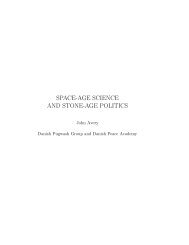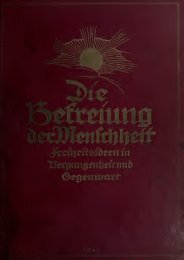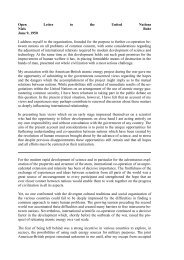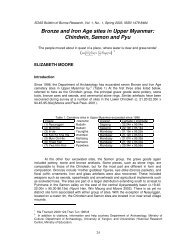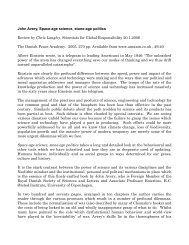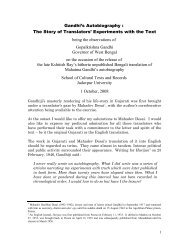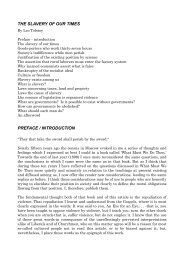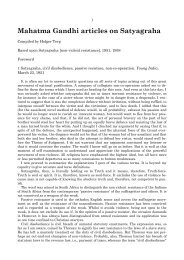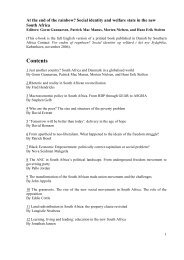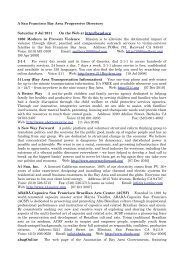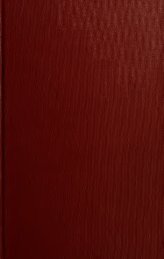- Page 2:
Digitized by the Internet Archive i
- Page 10 and 11:
PUBLICATIONS DE L'INSTITUT NOBEL NO
- Page 12 and 13:
64Ga83 Dct Mallingske Boktrykkcri -
- Page 14 and 15:
entes à une telle tâche. Il n'est
- Page 16 and 17:
Chap. V. Pacifisme et international
- Page 19 and 20:
CHAPITRE PREMIER CARACTÈRES GÉNÉ
- Page 21 and 22:
CARACTÈRES GÉNÉRAUX DE L'ÂOE DE
- Page 23 and 24:
CARACTÈRES GÉNÉRAUX DE L'AOl': D
- Page 25 and 26:
CARACTERES GÉNÉRAUX J)K LAtJK I)K
- Page 27 and 28:
CHAPITRE II ANARCHIE INTERNATIONALE
- Page 29 and 30:
THOMAS IIOBBKS corpore politico ".'
- Page 31 and 32:
THOMAS HOBBES l'intérêt de tous,
- Page 33 and 34:
THOMAS HOBBES ,, It may per adventu
- Page 35 and 36:
THOMAS HOBIiES warned and to be for
- Page 37 and 38:
THOMAS HOBBES zumal vorzubeugen, de
- Page 39 and 40:
BARUCH SPINOZA d'achever ses spécu
- Page 41 and 42:
nAuucii srixozA nihil utilius quani
- Page 43 and 44:
RARUCH 8PINOZA ment de Hobbes. Le p
- Page 45 and 46:
BARUCH SPINOZA l'Etat soit moins he
- Page 47 and 48:
BARUCH SPINOZA Il est naturel que S
- Page 49 and 50:
BARUCH SPINOZA fédérés ".'' On c
- Page 51 and 52:
BARUCH SPINOZA Tous les deux, ils o
- Page 53 and 54:
DOCTRINE DE L'EQUILIBRE formes sous
- Page 55 and 56:
DOCTRINE DE L'EQUILIBRE En 1680 un
- Page 57 and 58:
DOCTRINE DE L'EQUILIBRE (p. 84).
- Page 59 and 60:
DOCTRINE DE L'EQUILIBRE les deux se
- Page 61 and 62:
DROIT INTERNATIONAL ET „ DROIT DE
- Page 63 and 64:
DROIT INTERNATIONAL ET „ DROIT DE
- Page 65 and 66:
RICHARD ZOUCH lui.' Même là où i
- Page 67 and 68:
SAMUEL RACHEL § 2. SAMUEL RACHEL,
- Page 69 and 70:
SAMUEL RACHEL Et de là est dériv
- Page 71 and 72:
SAMUEL RACHEL ments volontaires par
- Page 73 and 74:
SAMUEL RACHEL sont du domaine du Dr
- Page 75 and 76:
SAMUEL PUFENDORF § 3. SAMUEL PUFEN
- Page 77 and 78:
SAMUEL PUFENDORF néanmoins ce qu'o
- Page 79 and 80:
SAJIUEL PUFEXDORF D'autre part l'ho
- Page 81 and 82:
SAMUEL PUFENDORF à la guerre aux c
- Page 83 and 84:
CHAPITRE IV ANTIMILITARISME DES SEC
- Page 85 and 86:
COURANT MYSTIQUE Même en dehors de
- Page 87 and 88:
PAUL FELGENHAUER cilhtni Bcflifiiii
- Page 89 and 90:
PAUL FELGENHAUKR Au fond ce titre-a
- Page 91 and 92:
PAUL FELGENHAUER entre les confessi
- Page 93 and 94:
WILLIAM PENN sur les dangers de la
- Page 95 and 96:
WII.IJAM PKXX C'est là le principe
- Page 97 and 98:
WILLIAM PENN états des Etats-Unis.
- Page 99 and 100:
WILLIAM PENN litiges éventuels à
- Page 101 and 102:
WILLIAM PENN manière de voir, à c
- Page 103 and 104:
mLLIAM PENX force avait encouragé
- Page 105 and 106:
WILLIAM PEisS : PROJKT DE PAIX they
- Page 107 and 108:
WILLIAM PENN : PROJET DK PAIX sente
- Page 109 and 110:
WILLIAM PEXN : PROJET DE PAIX briè
- Page 111 and 112:
WILLIAM PENN : PROJET DE PAIX les c
- Page 113 and 114:
WILLIAM PENN : PROJET DK PAIX C'est
- Page 115 and 116:
WILLIAM PENN : PROJET DE PAIX Il ne
- Page 117 and 118:
WILLIAM PENN : PROJET DE PAIX qui n
- Page 119 and 120:
LA TRADITION QUAKÉRIENNE. JOHN BEL
- Page 121 and 122:
LA TRADITION Ql'AKÉRlKNNE. JOHN HK
- Page 123 and 124:
LA TRADITION ylAKÉRIENNE. JOHN BEL
- Page 125 and 126:
LA TRADITION gl'AKÉRIENNK. JOHN li
- Page 127 and 128:
CHAPITRE V PACIFISME ET INTERP^ATIO
- Page 129 and 130:
AUTEURS ANGLAIS DU XVlie SIÈCLE re
- Page 131 and 132:
AUTEURS ANGLAIS DU XVIF SIÈCLE la
- Page 133 and 134:
BOSSUET Et cet Etat ne peut être q
- Page 135 and 136:
PASCAL Ici déjà on constate que c
- Page 137 and 138:
LA BRUYERE la nature, et j'ose dire
- Page 139 and 140:
FÉNELON Immédiatement après la r
- Page 141 and 142:
FÉNELON ne devait pas voir les dé
- Page 143 and 144:
FÉNELON obligés à se traiter mut
- Page 145 and 146:
FÉNELON de la „ monarchie univer
- Page 147 and 148:
FÉNELON Coriolan est vite converti
- Page 149 and 150:
VAUBAN Chargé par le Régent de fa
- Page 151 and 152:
VAUBAN de terre en Italie ni au del
- Page 153 and 154:
BOISGUILLEBERT On sait l'importance
- Page 155 and 156:
BOULAINVILLIERS II est plus étrang
- Page 157 and 158:
AUTEURS ALLEMANDS II était un peu
- Page 159 and 160:
AUTEURS ALLEMANDS et des complémen
- Page 161 and 162:
LEIBNIZ Mais comme conseiller priv
- Page 163 and 164:
LEIBNIZ et Boineburg était d'avis
- Page 165 and 166:
LEIBNIZ sur un pied d'égalité et
- Page 167 and 168:
LEIBNIZ christ. Ensuite, il était
- Page 169 and 170:
LEIBNIZ confédération devaient av
- Page 171 and 172:
LEIBNIZ de l'Allemagne : les ambiti
- Page 173 and 174:
LEIBNIZ et ainsi leur assurer une p
- Page 175 and 176:
LEIBNIZ pas d'affirmer avec force q
- Page 177 and 178:
LEIBNIZ et nous devons tenir compte
- Page 179 and 180:
LES ÉlvnGRÉS AUX PAYS-BAS pagatio
- Page 181 and 182:
JOHN LOCKE et la pensée de John Lo
- Page 183 and 184:
JOHN LOCKE et fit traduire son gran
- Page 185 and 186:
JOHN LOCKK pas nécessaire de croir
- Page 187 and 188:
JOHN LOCKE Ce qui caractérise tout
- Page 189 and 190:
JOHN LOCKK declared siich an Intent
- Page 191 and 192:
JOHN LOCKE tical Right over the Per
- Page 193 and 194:
JOHN LOC'lvE soi un facteur de rich
- Page 195 and 196:
PIERRE BAYLE Au lieu de cela, on vo
- Page 197 and 198:
PIERRE BAYLE „ Letter on Tolerati
- Page 199 and 200:
iKKKIO I3AVLK retour en France. Il
- Page 201 and 202:
iEKRE IJA^LE Pour cliiiiiner une so
- Page 203 and 204:
PIERRE BAYLE rapport à la Képiibl
- Page 205 and 206:
.IKAX BARBEYRAC Jean Barbeyrac naqu
- Page 207 and 208:
JEAN BARBEYRAC Comme on le voit, Ba
- Page 209 and 210:
CHAPITRE VII L'IDÉE DE PROGRÈS ET
- Page 211 and 212:
L'IDÉE DE PROGRÈS situation. A ce
- Page 213 and 214:
FONTENELLE autres et dont l'enchaî
- Page 215 and 216:
SAINT-PIKRRE (>Sa production litté
- Page 217 and 218:
SAINT-PIERRE La manière dont Saint
- Page 219 and 220:
8A1NT-PIERRE s'il est possible, ave
- Page 221 and 222:
SAINT-PIERRE gences s'élevaient en
- Page 223 and 224:
SAIXT-PIERRE rien à ciaiiidie d"au
- Page 225 and 226:
SAINT-PIERRE à présent, soit dans
- Page 227 and 228:
SAINT-PIERRE mentaux de Frédéric
- Page 229 and 230:
SAINT-PIERRE bonheur d'avoir des Lo
- Page 231 and 232:
SAINT-PIERRE Dans un autre domaine
- Page 233 and 234:
LE MILIEU INTELLECTUEL du nouveau r
- Page 235 and 236:
LE MILIEU INTELLECTUEL au protestan
- Page 237 and 238:
JOSEPH ADDISON -Maçonnerie, les cl
- Page 239 and 240:
JOSEPH ADDISON et constituèrent la
- Page 241 and 242:
JOSEPH ADDISON Steele avait égalem
- Page 243 and 244:
DANIEL DEFOE En philosophie, Defoe
- Page 245 and 246:
DANIEL DEFOE and so by Addition of
- Page 247 and 248:
DANIEL DEFOE Le roman n'en eut pas
- Page 249 and 250:
JONATHAN SWIFT l'empêchaient d'ado
- Page 251 and 252:
JONATHAN SWIFT elle vise tout d'abo
- Page 253 and 254:
JONATHAN SWIFT qui concerne son pro
- Page 255 and 256:
BERNARD DE MANDEVILLE purchase the
- Page 257 and 258:
BERNARD DE .MANDEVILLE nor Tyranny
- Page 259 and 260:
LUDVIG HOLBERG Né à Bergen en Nor
- Page 261 and 262:
LUDVIG HOLBERG et les temps moderne
- Page 263 and 264:
LUDVIG HOLBERG J'ai déjà dit que
- Page 265 and 266:
LES PHILOSOPHES FRANÇAIS tent un a
- Page 267 and 268:
MONTESQUIEU qui en est la conséque
- Page 269 and 270:
VOLTAIRE et non pas une despotie. U
- Page 271 and 272:
VOLTAIRE La situation même qui pr
- Page 273 and 274:
ROUSSEAU sidérations d'ordre prati
- Page 275 and 276:
ROUSSEAU dépens de leurs voisins c
- Page 277 and 278:
DIDEROT souverains sages et raisonn
- Page 279 and 280:
DALEMBERT Taitiens, pleurez, mais q
- Page 281 and 282:
DHOLBACH D'après le baron d'Holbac
- Page 283 and 284:
MABLY du pa_vs à l'époque où le
- Page 285 and 286:
CARDINAL ALBERONI d'Espagne avec El
- Page 287 and 288:
EOI5ALD TOZK de commerce, pourvu qu
- Page 289 and 290:
SAINTARD portait tout d'abord le tr
- Page 291 and 292:
ANGE GOUDAR d'ambitions politiques
- Page 293 and 294:
LA HARPE — GAILLARD régions éco
- Page 295 and 296:
A. PALIER DE SAINT GERMAIN on appro
- Page 297 and 298:
VALEXTIN EMBSER d'iiistincts sociau
- Page 299 and 300:
CHAPITRE IX LA POLITIQUE EUROPÉENN
- Page 301 and 302:
LA DOCTRINE PFC LÉQUILIBRE Les tra
- Page 303 and 304:
LA DOCTRINE DIO L'ÉQUILIRRK fois l
- Page 305 and 306:
LA DOCTRINK DIO I/ÉQUILIBRE L'aute
- Page 307 and 308:
LA DOCTRINE DE L'ÉQUILIBRE sances
- Page 309 and 310:
LA DOCTRINE DE L'ÉQUILIBRE La mora
- Page 311 and 312:
CHRISTIAN WOLFF Wolff se rend compt
- Page 313 and 314:
EMERIC DE VATTEL que le but de son
- Page 315 and 316:
KMinUf DE ^ATT1•:L ,, Former et s
- Page 317 and 318:
KARL GÛNTHER mentale que les Etats
- Page 319 and 320:
JOHANN JACOB MOSER seurs et égalem
- Page 321 and 322:
GEORG FRIEDRICH VON MARTENS la vér
- Page 323 and 324:
CHAPITRE X LA NOUVELLE SCIENCE DE L
- Page 325 and 326: FRANÇOIS QUESNAY pôles et sans re
- Page 327 and 328: JACQUES TURGOT § 2. JACQUES TURGOT
- Page 329 and 330: JACQUES TURGOT tiendrait le vieux s
- Page 331 and 332: JACQUES NFX'KER ment de la paix et
- Page 333 and 334: JACQUES NECKER Necker ne peut admet
- Page 335 and 336: DAVID HUME son premier séjour y es
- Page 337 and 338: DAVID HUME ments révolutionnaires
- Page 339 and 340: DAMD HUME la partie adverse qu'enve
- Page 341 and 342: eyond its level, while it circulât
- Page 343 and 344: JOSIAH TUCKER souligne notamment da
- Page 345 and 346: JOSIAH TUCKER L'influence de ces gr
- Page 347 and 348: ADAM SMITH § 3. ADAM SMITH, 1723
- Page 349 and 350: ADAM SMITH vue s'y affirme encore d
- Page 351 and 352: ADAM SMITH une carrière sociale. U
- Page 353 and 354: JOHANN-AUGUST SCHLETTVVEIN rich, fo
- Page 355 and 356: JOHANN-AUGUST SCHLETTWEIN l'Etat po
- Page 357 and 358: JEREMY BENTHAM italien Beccaria qui
- Page 359 and 360: Jf:RI':MY BKNTHAM Benthani maintien
- Page 361 and 362: JEREMY BENTHAM it wants of being ri
- Page 363 and 364: JERKMY HKNTHAM damentaux régissant
- Page 365 and 366: CHAPITRE XI L'ÉPOQUE DES RÉVOLUTI
- Page 367 and 368: LA RÉVOLUTION AMÉRICAINE terre de
- Page 369 and 370: LA RÉVOLUTION AMÉRICAINE (On deva
- Page 371 and 372: THOMAS PAINE Comme la plupart des g
- Page 373 and 374: THOMAS PAINE Paine estime que les m
- Page 375: ANTHONY BENEZET ordonnerait de fair
- Page 379 and 380: LA CONSTITUTION DE L'UNION était-i
- Page 381 and 382: LA CONSTITUTION DE L'UNION Mais dan
- Page 383 and 384: B: LA RÉVOLUTION FRANÇAISE § 1.
- Page 385 and 386: IDÉES ET RÉALITÉS Ces idées tir
- Page 387 and 388: VOLNEY mener et de conclure la paix
- Page 389 and 390: VOLNEY considérés comme individus
- Page 391 and 392: ROBESPIERRE narres se divisèrent s
- Page 393 and 394: ANACHARSIS CLOOTS Nous allons maint
- Page 395 and 396: ANACHARSIS CLOOTS Art. II. Tout ind
- Page 397 and 398: CONDORCET à celui de la force. Les
- Page 399 and 400: CONDORCET l'esprit humain, professi
- Page 401 and 402: L'ABBÉ GRÉGOIRE Art. 3. — Un pe
- Page 403 and 404: L'ABBÉ GRÉGOIRE Comme Condorcet e
- Page 405 and 406: QUELQUES OUVRAGES POSTÉRIEURS À 1
- Page 407 and 408: QUELQUES OUVTIAGES POSTÉRIEURS A 1
- Page 409 and 410: QUELQUES OUVRAGES POSTÉRIEURS À 1
- Page 411 and 412: VON ZINZENDORF De même qu'il consi
- Page 413 and 414: LESSING ils devaient être en mesur
- Page 415 and 416: WIELAND Cette synthèse, Wieland r
- Page 417 and 418: HERDER kônnten die Vôlker Europas
- Page 419 and 420: HERDER S'il condamnait l'usage de l
- Page 421 and 422: IMMANUEL KANT lution française est
- Page 423 and 424: IMMANUEL KANÏ Dans son œuvre maî
- Page 425 and 426: IMMANUEL ICANT s'il ne pouvait pas
- Page 427 and 428:
IMMANUEL KANT siissen Traum trâume
- Page 429 and 430:
IMMANUEL KANT l'internationalisme.
- Page 431 and 432:
IMMANUEL KANT ander noch wenig befe
- Page 433 and 434:
RICHARD PRICE plus violente. Mais d
- Page 435 and 436:
EDMUND BURKE avant que ce dangereux
- Page 437 and 438:
PUBLICATIONS PACIFISTES to acknowle
- Page 439 and 440:
PUBLICATIONS PACIFISTES renoncer au
- Page 441 and 442:
VICESIMUS KNOX Europe ".' Knox éta
- Page 443 and 444:
DELISLE DE SALES laissant la Belgiq
- Page 445 and 446:
J. ECHASSÉRIAUX La paix d'Amiens (
- Page 447 and 448:
J. J. B. GONDON des peuples, de leu
- Page 449 and 450:
NAPOLÉON ,, L'empire français dev
- Page 451 and 452:
fichtp: le plus apparent, résultat
- Page 453 and 454:
FICHTE toyens du monde (Volker- und
- Page 455 and 456:
JEAN PAUL eitel und ein leeres Trug
- Page 457 and 458:
FRIEDRICH VON GENTZ L'époque même
- Page 459 and 460:
BONALD ouvrage „ Der geschlossene
- Page 461 and 462:
HEGEL Friedrich Hegel (1770— 1831
- Page 463 and 464:
BENJAMIN CONSTANT restreinte à un
- Page 465 and 466:
LE PACIFISME TRADITIONNEL church re
- Page 467 and 468:
LK PAf'TFlSMK TRADFTIONNKL cas dans
- Page 469 and 470:
LE PACIFISME TRADITIONNEL Un autre
- Page 471 and 472:
CHAPITRE XIII LE CONGRÈS DE VIENNE
- Page 473 and 474:
POLITIQUE ET OHJECTIp-S DE PAIX nai
- Page 475 and 476:
POLITIQUE ET OBJECTIFS DE PAIX que
- Page 477 and 478:
POLITIQUE ET OBJECTIFS DE PAIX d'ai
- Page 479 and 480:
POLITIQUE 1:T OaiECTIF.S DiO PAIX ,
- Page 481 and 482:
SAINT-SIMON ganisa l'Europe et le t
- Page 483 and 484:
«AINT-SIMON. - CONCLUSION parlemen
- Page 485 and 486:
OUVRAGES CITP:S (Les eliiffrcs renv
- Page 487 and 488:
OUVRAGES CITÉS Constant (Benjamin)
- Page 489 and 490:
OUVRAGES CITÉS Herder (Johann Gott
- Page 491 and 492:
OUVRAGES CITÉS Mably, Entretiens d
- Page 493 and 494:
OUVRAGES CITÉS (Sales, Delilse de)
- Page 495 and 496:
TABLE ALPHABÉTIQUE des noms propre
- Page 497 and 498:
FONTENELLE (BeRNARD LE BoVlER DE),
- Page 499 and 500:
MosKR (Johann Jacob), 285, :W0~302
- Page 505:
IIANDBOUNO AT THE 2 B!NDir>iG D£PT



